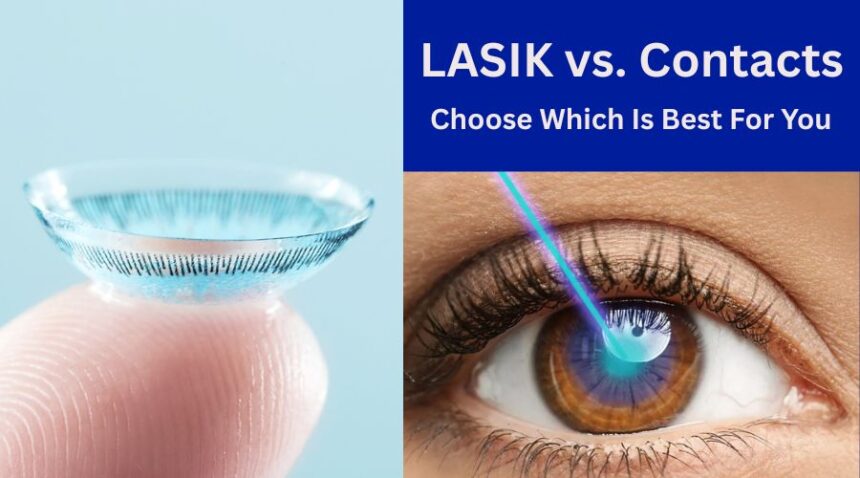Although the thought of getting laser eyeballs may make you feel as though you’ve just entered a sci-fi film set, the future is here, and you’re welcome. Nevertheless, there is a devoted following for contact lenses. But few are still unsure which camp to choose.
We clear up the misunderstanding by providing you with a side-by-side comparison of LASIK and contacts below, which addresses the important factors including risks, recovery time, cost, length, and operation.
Brief Comparison
Let’s quickly go over a comparison between contacts and LASIK:
- Duration: Contact lenses are a daily or monthly commitment, whereas LASIK can be permanent (though your eyes may still change over time).
- Surgery: While standard contact lenses only require a little skill to insert, LASIK is a quick surgical procedure that requires neither scalpels nor lasers. (No, you will come close, but you don’t need to contact your eyeball directly.)
- Cost: LASIK often entails a single, large payment followed by (ideally) years of improved vision. Although the cost might be spread out over time, contacts eventually pile up.
- Recovery time: While contact lenses may need a little period of adjustment before you feel comfortable wearing them, LASIK recovery can be swift.
- Risk: Both carry some danger. Although they are uncommon, surgical complications from LASIK are possible, and improper contact lens usage or insertion can cause discomfort or infection.
You may be considering implanted contact lenses (ICLs) if you’ve ever desired for permanently placed superhero lenses—minus the cape. ICLs are surgically positioned inside your eye behind the iris, in contrast to conventional contacts.
Let’s make your lifestyle the best while examining the three choices in greater detail:
- LASIK: A laser is used by a surgeon to reshape your cornea so that light focuses more precisely on your retina. This procedure is known as laser-assisted in situ keratomileusis, or the quickest way to feel like you’re living in a futuristic novel. For those with intermediate nearsightedness, farsightedness, or astigmatism (with some restrictions), LASIK is frequently the best option.
- Contacts: The tiny, pliable lenses we are familiar with and occasionally adore. To correct vision, you apply them to the surface of your eye. They come in fancier variations for astigmatism or multifocal needs, as well as daily, biweekly, or monthly options. The majority of people adjust to contacts quite readily; however, there may be some dryness and irritation.
- ICLs: A surgical technique that involves implanting a lens into the eye. For those whose corneas are thin or whose prescriptions are too high for LASIK, it is usually a possibility. Some individuals swear by it as a nice compromise between LASIK and conventional contacts, despite the fact that it costs more.
LASIK vs. Implantable Contact Lenses
Let’s examine the differences between LASIK and implantable contact lenses before you embark on your epic journey for perfect vision. Both entail having your eye altered by a surgeon, but there are some obvious distinctions to be aware of.
Benefits
- Improvement of vision over the long term: ICLs and LASIK provide a sort of “set it and forget it” convenience. Following a successful treatment, many people are able to throw away their glasses. (As an optional extra, some people perform it theatrically.)
- Perfect for high-prescription drugs, particularly ICLs: ICLs may frequently tolerate a wider range than LASIK if you’ve been told your prescription is really high (e.g., “Whoa, you’re in the double digits!”).
- Less daily hassle compared with traditional contacts: You don’t have to deal with cleaning agents or lens bags anymore. (Yes, you still need to keep up your good practices, but it’s a lot easier than putting in your lenses every day.)
- Vision quality: Both LASIK and ICL procedures have been reported to provide clear, stable vision by many patients. This is fantastic news if you don’t want to rely on your memory to locate your glasses on the nightstand.
Drawbacks
- Surgical side effects: Although they are not common, dry eyes, glare, halos, or infection can occur with both procedures. Remember: Always heed the advice of an eye care specialist because your eyes are sensitive property.
- Recovery duration: ICLs may require a little more time to rest, however, LASIK usually delivers a quick recovery. Either way, your first goal should be to avoid rubbing your eyes like you’re looking for a genie.
- Cost: ICLs and LASIK procedures can eye costly. Make sure to check your plan (and your piggy fund) because insurance may not cover elective surgery.
- Not for everyone: Your eye care specialist may advise against these procedures if you have specific eye health conditions, such as thin corneas or very dry eye.
If in doubt, make an appointment for a consultation.
LASIK

Now, let’s delve into the specifics of the original laser eye surgery. A laser is used to reshape the cornea during LASIK. Although numbing pills make it seem pleasant, the thought of a laser dancing around your eyelids can make you uneasy. Most patients recover quickly, and they soon discover that their vision has greatly improved. We’ve broken down the details below so you can determine if it’s right for you.
LASIK Pros
Have you ever wished you could see the alarm clock without squinting when you wake up? Let’s highlight all the reasons why laser eye surgery could be your personal vision angel.
- Results that last: A single operation can provide many people clear vision for years or even decades.
- Quick recovery: Most people return to their regular activities very quickly after feeling comfortable for a few days.
- Convenient lifestyle: No more searching in the morning for misplaced glasses, and no more changing your contact lenses every night.
- Proven track record: LASIK has been used for many years, and newer technology translates into increased safety and precision.
LASIK Cons
- Cost: Unless you look for a payment plan, LASIK can be a one-time expense, frequently in the hundreds. Some people view it as an investment, but the price tag may make you gag.
- Possible adverse effects: There may be glare, halos, dry eyes, or trouble seeing at night. These problems typically get better with time, although they can occasionally be chronic.
- Not entirely reversible: LASIK is permanent, unlike contact lenses that you can easily take out. This implies that you may wear clear-lensed eyeglasses if you adore how they make a fashion statement.
- Vision changes over time: As you age, your vision may still shift, even if LASIK initially works flawlessly. Only a small portion of people will eventually require augmentation surgery.
What prevents physicians from recommending LASIK?
Some eye care specialists might be reluctant to suggest LASIK if a patient has:
- Too dangerous to reshape extremely thin corneas.
- Dry eyes that could get worse after surgery
- Some autoimmune diseases or unstable medications
Essentially, eye care professionals want to avoid exacerbating your eye issues, so if they say “no go,” there’s probably a valid reason. They might urge you to keep wearing your regular contacts or perhaps recommend implanted contact lenses.
Who isn’t a LASIK candidate?
LASIK is not an option for you if you have:
- An unstable prescription: Wait until things stabilize if your vision continues to fluctuate annually.
- An eye condition: You may not be eligible if you have advanced glaucoma, corneal disorders, or severe dry eye.
- An oven-baked bun: Your vision (and corneal thickness) may be momentarily impacted by hormonal fluctuations.
- Having less than 18–21 years of life experience: Before authorizing LASIK, eye care providers frequently wait for complete ocular maturity.
When is LASIK no longer worth it?
Although there isn’t a set “LASIK expiration date,” age-related problems like cataracts or presbyopia could make the procedure less appealing. Once in their 60s or 70s, many people think it is less practical, particularly if they may soon require cataract surgery (which can also correct eyesight). To find out if you will benefit in the long run, always obtain a professional review.
For LASIK, what prescription is too high?
If your prescription is really strong (think -10.00 diopters or more), LASIK may not produce the desired outcomes or may be riskier because of the amount of cornea that needs to be reshaped. This is where LASIK vs. implantable contact lenses may become a crucial factor. Sometimes, ICLs manage those high prescriptions in a more sophisticated manner.
Does having astigmatism prevent you from getting LASIK?
Modern LASIK methods can often repair mild to moderate astigmatism. Other options, such implanted lenses or specialized contacts, may be necessary for severe or irregular astigmatism. To determine whether you’re a good fit, an eye care specialist will measure your corneas.
Are LASIK less dangerous than Contacts?
It all comes down to a single, crucial question. Are contacts less dangerous than LASIK? That depends on your eyeballs and habits, we guess. Although LASIK entails surgical risks, the overall risk is minimal for healthy individuals. Conversely, contact lenses have drawbacks of their own, such as prolonged use that deprives your eyes of oxygen or poor cleaning that results in infections.
The dangers are minimal if you follow the instructions in the booklet, wash your hands, use fresh solution, and avoid wearing your contacts too often.
However, if you sleep in your lenses for two weeks in a row and believe that cleaning solution is “magic water,” your risk of infection increases significantly. If so, a one-time LASIK operation might be safer for your long-term eye health.
Contact Lenses

The dangers are minimal if you follow the instructions in the booklet, wash your hands, use fresh solution, and avoid wearing your contacts too often.
However, if you sleep in your lenses for two weeks in a row and believe that cleaning solution is “magic water,” your risk of infection increases significantly. If so, a one-time LASIK operation might be safer for your long-term eye health.
To correct for your nearsightedness, farsightedness, or astigmatism, contacts bend light. The breathable materials used to make modern lenses aid in the delivery of oxygen to your eyes.
Nevertheless, you must adhere to the right timetable, clean them appropriately, store them in the right way, and maintain good lens hygiene.
Advantages of lenses
Do you not like the idea of corneal reshaping? For a long time, contact lenses have been popular, and these are the primary reasons why:
- No need for surgery: Contacts can be a no-brainer if you’re afraid of a laser close to your eyeball.
- Reduced initial outlay: You don’t have to pay thousands of dollars all at once, even though the expenses do mount up over time.
- The ability to change: One day, no contacts at all? Put on your spectacles, please. No huge deal. Additionally, you can experiment with other hues and varieties.
- Before purchasing, try: To determine whether they are comfortable and effective, you can try on a trial pair from your eye care specialist.
Disadvantages of contact lenses
Naturally, every vision solution has its peculiarities. Before you commit to wrestling with little discs every morning, let’s discuss some possible red flags:
- Daily upkeep: They must be properly cleaned, stored, and replaced. Otherwise, welcome to illness or discomfort.
- Continuous expenses: The costs can mount up over time, regardless of whether you’re using high-end toric lenses for astigmatism or daily disposables.
- Infection risk: Eye infections can result from improper hygiene, using too many contacts, or letting lenses come into contact with water while swimming or taking a shower. Having Acanthamoeba keratitis is unpleasant.
- Danger of slipping out: Everyone has gone through the panic that occurs when a contact moves to the back of their eyeball. (It’s never a nice time, but it typically doesn’t go far.)
Compared to LASIK, are contacts safer?
If you follow the guidelines, contacts can be safer than LASIK for a lot of people. You avoid those specific concerns because contacts don’t require your cornea to be surgically modified.
However, if you’re a little too careless about lens maintenance, you run a higher risk of infection, scrapes, and dryness from using contact lenses daily. In that regard, if LASIK helps you break bad lens habits, it may make your life safer in the long run.
The safety issue ultimately boils down to individual accountability and eye health. Contact lenses should be safe if you’re a champion lens cleaner and remover.
To lower the chance of infection, try daily disposables or discuss laser surgery with your eye care specialist if you’re, say, “lax” about hygiene.
LASIK or contact lenses?

Which is it, LASIK or contact lenses? Your priorities, financial situation, level of surgical comfort, and level of contact lens hygiene discipline will all influence your decision.
1-800 Contacts can assist you in locating the precise brand that your eye care specialist recommends if you’re leaning toward contact lenses—perhaps you’re not quite ready to commit to laser beams or implantable lenses. Keep things tidy, adhere to your wearing schedule, and at the end of the day, relish the benefits of clear, lens-free peripheral vision.
Were you aware that contacts could be ordered online?
Convenience is here to replace trips to the eye doctor. You may conveniently get your contact lenses online and have them delivered right to your door with 1-800 Contacts. Additionally, you can easily obtain the prescription you require without ever leaving your house, thanks to our online vision exam. What’s the best part? When you place your first order with 1-800 Contacts, you will save money. Getting your contact information has never been simpler!
FAQs
Q1 Are name-brand contact lenses available at 1-800 Contacts?
Ans: Yes, you get the same contact lenses that you would get from your eye doctor. This includes all of the popular brands, such as Acuvue, Soflens, Air Optix Aqua, Optima, PureVision, Focus, and Biomedics, as well as more difficult-to-find specialty lenses like colored, toric, bifocal, multifocal, and disposable lenses.
Q2. How about some eyewear?
Ans: Good news! Just for being a customer of 1-800 Contacts, you can receive 30% off new glasses from The Framery, the fantastic eyewear brand of 1-800 contacts.
Q3. Is vision insurance accepted at 1-800 Contacts?
Ans: Indeed. In-network providers include 1-800 Contacts for:
- Anthem BCBS.
- Superior Vision (Versant Health)
- Davis Vision
- United Healthcare’s Spectera
- EyeMed administers
- Blue View Vision
Q4. Can I use the internet to renew my prescription?
Ans: Indeed! With ExpressExam, our online vision test, you can easily renew your prescription. A doctor-issued prescription is added to your account within two business hours for convenient ordering, and it takes less than ten minutes. Find out more and determine your eligibility.
Q5. Does placing an order require a prescription?
Ans: Indeed. Every order requires a valid prescription; this is required by law. You can still order contact lenses from us even if you don’t have a copy of your prescription. When placing your order, simply look up your eye doctor’s information on our website. All you’ll need is the name of your eye care provider (or clinic), along with the state and locality.
To ensure you receive the right contacts, we will check your prescription with your eye care professional after you place your order. Up to one business day may pass during this process.











